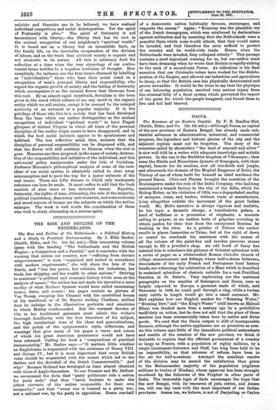THE RISE AND DECLINE OF THE NETHERLANDS.
The Rise and Decline of the Netherlands a Political History and a Study in Practical Statesmanship. By J. Ellis Barker. (Smith, Elder, and Co. 10s. 6d. net.)—This interesting volume opens with the heading "The Netherlands and the British Empire a Comparison and a Parallel," and it concludes with the warning that unless our country, now "suffering from chronic misgovernment," is soon "organised and united in accordance with modern requirements," she will share the fate of the Dutch, and "lose her power, her colonies, her industries, her trade, her shipping, and her wealth to other nations." Striving to oonstruct "a political and economic history which aims at the analysis of causes," the author has not made his narrative a mere medley of what Herbert Spencer would have called unmeaning names, dates, and events, his pages contain no picture of Vas Tromp sweeping the Channel with the symbolical broom at his masthead, or of De Ruyter raiding Chatham, neither does he indulge in the illustrative portraits and anecdotes to which Motley condescended. But the warmest devotee of Clio in her traditional garments must admit the writer's thorough familiarity with the best literature of his subject, the high intellectual tone of his ideas and generalisations, and the polish of the epigrammatic style, reflections, and warnings that give many of his pages a verve and colour of which his great American predecessor would not have been ashamed. Calling his book a "compendium of practical statesmanship," Mr. Barker says :—" It matters little whether an Englishman is acquainted with the existence of Henry VIII. and George IV., but it is most important that every British voter should be acquainted with the causes which led to the decline and the downfall of the Dutch Commonwealth." And why? Because Holland has developed on lines almost identical with those of Anglo-Saxondom. To our Premier and Mr. Balfour we recommend the dicta that "party politicians rule a nation for party ends," that they "never hesitate to make the ablest servants of the nation responsible for their own incapacity," and that "every war is treated as a party war, not a national war, by the party in opposition. Hence one-half
of a democratic nation habitually favours, encourages, and supports the enemy." Again : Economy was the plausible cry of the Dutch demagogues, which was reinforced by declarations against militarism and by asserting that the Netherlands were a peaceful State which none would attack, that they would never be invaded, and that therefore the navy sufficed to protect the country and its world-wide trade. Hence, when the Netherlands were invaded, they collapsed utterly." This passage contains a most important warning for us, but our author must have been dreaming when he wrote that Britain is rapidly sinking to the rank of a second-rate Power. As ridiculous is his final assertion that our Cobdenite rulers have worked for the disinte- gration of the Empire, and allowed our industries and agriculture to decay, so that the British race has physically deteriorated and grown unwarlike. It would be far truer to say that the physique of our labouring population received very serious injury from the criminal folly of a fiscal system which prevented the import of the grain for which the people hungered, and forced them to live and toil half starved.
















































 Previous page
Previous page